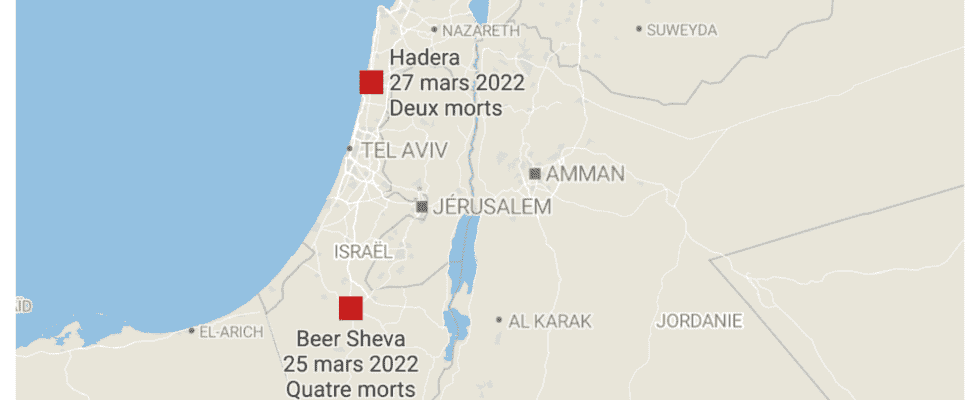Israel has been the target of two terrorist attacks in five days in the name of the Islamic State (IS). The first, which occurred on March 22 in Beersheva, was carried out by a Bedouin sympathizer of the jihadist group who killed two men and two women in a knife and ramming attack. He was sentenced in 2016 to four years in prison for planning to travel to Syria to fight with the IS group.
The second attack, claimed by IS, was perpetrated on Sunday March 27 in Hadera by two assailants, first cousins, says Wassim Nasrjournalist at France 24 and author of The Islamic State, the fait accompli (Plon). In their deadly enterprise, they killed two policemen, one of whom had dual nationality, French and Israeli, and injured several people. Equipped with automatic weapons, the attackers were neutralized by special forces, who thus certainly avoided a mass killing, with civilian victims.
The attacks were carried out five days apart
The Express
In a short time, Israel has therefore been hit by people close to or affiliated with the IS, so far rather spared by the terrorist organization. The last action perpetrated in the Jewish state and claimed by Daesh (acronym for the Islamic State in Arabic) dates back to June 2017. How can we explain the resurgence of this threat today when Israel has so far been spared by mass attacks perpetrated in certain European countries in recent years?
In fact, the terrorist group has never stopped considering Israel as one of its central enemies. In 2019, Abu Bakr al-Baghdadi’s successor, Abu Ibrahim el-Hashemi el-Qourachi – killed in February 2022 – said he was “determined” to begin a “new phase which is none other than fight the Jews and return what they stole from the Muslims”, and therefore to attack the State of Israel.
Islamic State attacks on the rise around the world
These attacks are to be analyzed under three different prisms, explains to L’Express Marc Hecker, specialist in terrorism at the French Institute of International Relations (Ifri) and author of The Twenty Years’ War: Jihadism and Counterterrorism in the 21st Century (Robert Laffont). The first is that of the Islamic State which “is in a period of transition after the loss of its territorial sanctuary in the Syrian-Iraqi zone, a period of increasing power compared to 2017-2019 when the group adopted more a defensive posture.
“Right now, the number of attacks is on the rise, with areas more affected and more visible than others such as the Sahelo-Saharan strip as well as the Syrian-Iraqi area, despite the recent death of the successor to Abu Bakr al-Baghdadi”, explains the specialist who also notes “a series of allegiances to the new emir, in the various provinces of the caliphate, which show a real dynamic of the group”.
As for the Salafo-jihadist movement, broader than the Islamic State alone, it has been present for fifteen years in Israel and in the region. In confrontation with the Palestinian Islamist factions, such as Hamas, “al-Qaeda and the Islamic State reject the nationalism of these factions, and therefore there is a real ideological opposition between these movements which clash sporadically, in particular in the strip of Gaza”, continues Marc Hecker.
A tense context
The second prism is the context of tensions between Israeli Arabs and Jewish citizens of Israel. A year ago, East Jerusalem, a mixed district of the torn city, was the scene of an escalation of violence between the two camps. “It is striking to see that the two successive attacks were committed by Israeli Arabs and that the Israeli security services failed to thwart such attacks,” said Marc Hecker.
Finally, the context in which the second attack occurred is “not trivial”, confides the specialist. Indeed, the day of the passage to the act was held a summit of the heads of diplomacy of the United States, Egypt, the Emirates, Bahrain and Morocco – the last three being signatories of the Abraham Accords – in a locality in the Negev desert. These agreements are two peace treaties between Israel and the United Arab Emirates on the one hand and between Israel and Bahrain on the other, aimed at normalizing the relations of the Hebrew country with certain Arab countries.
The attack perpetrated “when we were waiting for an official declaration on the sidelines of the summit could be interpreted as a way of violently opposing these agreements and diverting attention from the declaration which was going to take place”, analyzes Marc Hecker.
A diffuse threat
How to explain, apart from these three prisms of context, that the Islamic State has only very rarely attacked the State of Israel so far? For the specialist, it is a question of the effectiveness of the Israeli services in preventing the group from anchoring in their territory. “ISIS has no identified structured presence in Israel, these attacks are more in line with the logic of inspired terrorism with radicalized people who follow the calls to take action. There is a movement of Salafo-jihadist sympathizers, but it is not very large numerically. It is not comparable, for example, to the capacity of attraction and social structuring of Hamas in the Palestinian territories”, explains Marc Hecker.
A few hundred people had indeed tried to join the ranks of the terrorist group in Syria from Israel, but many were arrested. In addition, the country has the particularity of having a real know-how in the management of terrorism and attacks with a security apparatus that leaves very little room for maneuver to the jihadists.
It is therefore not for lack of will that the Islamic State has not acted as much in Israel as elsewhere, but for inability, because “the fact of wanting to liberate Palestine remains present in jihadist propaganda, the Israeli conflict “Palestinian remains in the background, confirms Marc Hecker. We are not dealing with a change of strategy but something is happening, two attacks in such a short time, it is to be taken seriously”.
